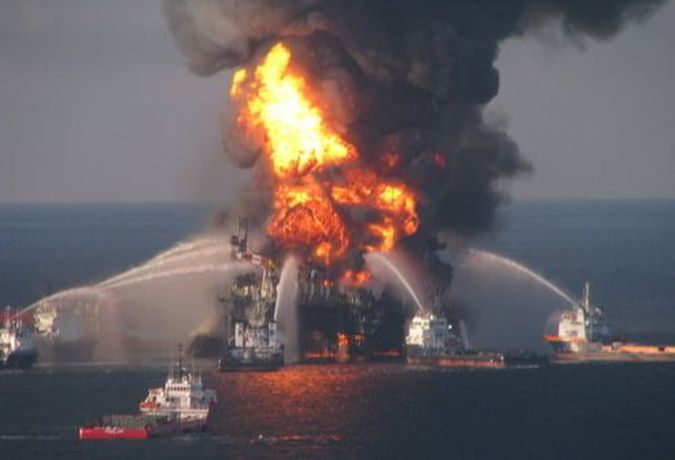Reflections, Regret, and Resolve: Marking the Eighth Anniversary of the Deepwater Horizon Disaster4/20/2018
Photo credit: NRDC Pix/Flickr Today marks the eighth anniversary of the Deepwater Horizon oil disaster. On April 20, 2010, the Deepwater Horizon rig exploded off the coast of Louisiana, killing 11 people and injuring 17 others. Two days later - on Earth Day - the rig, which was still engulfed in flames, collapsed into the ocean, sinking thousands of feet to the seafloor. For the next 87 days oil flowed into the Gulf of Mexico as BP and the U.S. federal government struggled to prevent this from becoming the worst environmental disaster since the 1989 Exxon Valdez oil catastrophe. Ultimately, over 200 million gallons of oil spewed into the Gulf of Mexico and 1.8 million gallons of chemical dispersant were pumped onto and into the Gulf to dilute the oil, making it the worst environmental disaster in U.S. history. Moving forward, it is important to remember these details, as time can blur the lessons learned from our past and leave us vulnerable repeating our mistakes. It is apparent that the new administration did not learn that offshore oil and gas exploration is inherently dangerous from this tragedy -- and that where we drill, we spill. In fact, it feels like we are destined to repeat the cycle again if the Trump administration implements its environmental agenda. As my colleague Jenna wrote in a recent blog, the Trump administration is on an anti-environmental protection crusade, much of which is focused on our ocean and coastal regions. Several of these proposed actions aim to roll back either geographic protections or regulations enacted as safety measures after the Deepwater Horizon disaster. Here are a few:
While this is list is not comprehensive, it does highlight that the Trump Administration appears to be heavily favoring industry over environment. Yet, not all is lost; there are silver linings from the BP oil spill. "The Deepwater Horizon oil spill in the Gulf of Mexico and resulting environmental crisis is a stark reminder of how vulnerable our marine environments are, and how much communities and the Nation rely on healthy and resilient ocean and coastal ecosystems." — President Barack Obama, Executive Order 13547, July 19, 2010 First, a mere four days after the well was finally capped, President Obama signed Executive Order 13547, creating the nation’s first-ever comprehensive National Policy for the Stewardship of the Ocean, Our Coasts, and the Great Lakes. The National Ocean Policy (NOP) charges our government to consider the entire ecosystem - and our role in it - when making decisions regarding ocean management. This approach is moving our nation away from the tired issues-by-issues management approach toward a comprehensive, informed, and strategic ecosystem-based management style. "America’s stewardship of the ocean, our coasts, and the Great Lakes is intrinsically linked to environmental sustainability, human health and well-being, national prosperity, adaptation to climate and other environmental changes, social justice, international diplomacy, and national and homeland security." — Executive Order 13547 Second, after the spill Congress passed the Resources and Ecosystems Sustainability, Tourist Opportunities, and Revived Economies of the Gulf Coast States Act (RESTORE Act), to oversee use of monies put into the Gulf Coast Restoration Trust Fund through penalties received by the U.S. federal government related to the Deepwater Horizon spill for restoration and protection of the region’s natural resources and economies.
Finally, organizations like Healthy Oceans Coalition member the Gulf Restoration Network (GRN), work hard to support their community with cleanup and advocacy initiatives in favor of implementing changes to drilling policies. To this day, the GRN continues its role as a watchdog against new and pervasive spills in the Gulf. If we are to break the post-tragedy cycle of forever reflecting on a tragedy then regretting the mistakes made that lead to it, we have to be resolved to break the cycle and learn from our errors. Eight years out, we remain committed to warding off another spill, especially in light of our federal leadership’s lack of prioritizing the health of our people, ocean, coasts, and Great Lakes. Comments are closed.
|
Archives
July 2024
Categories
All
|


